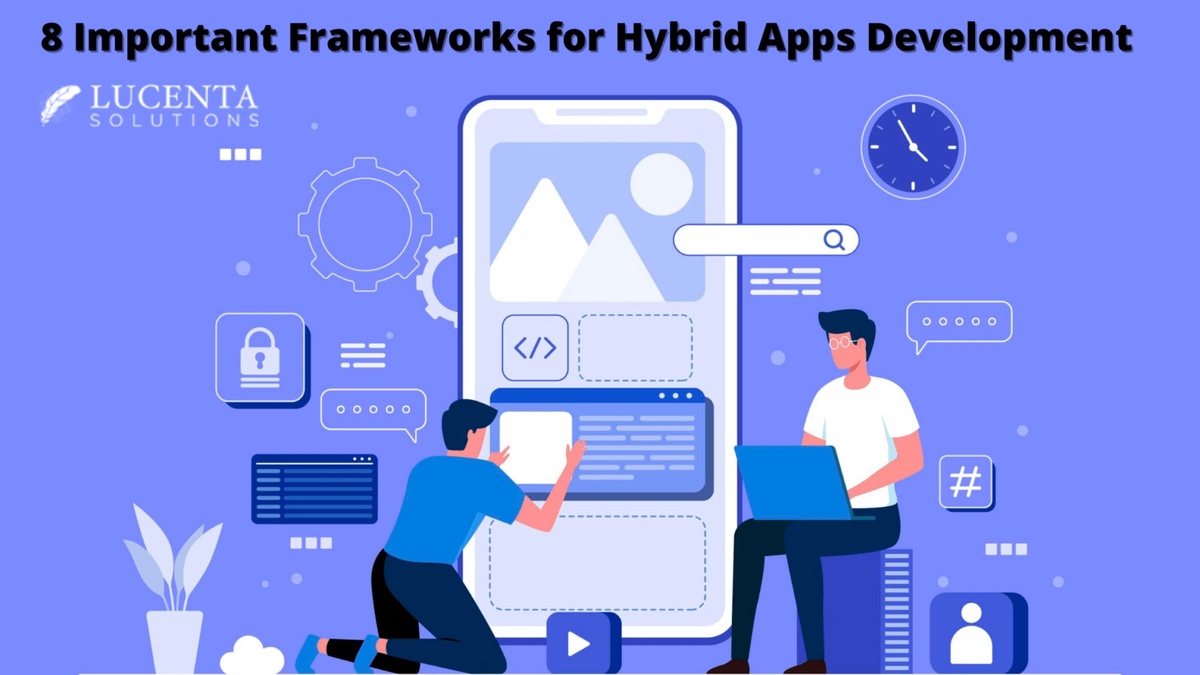Hybrid app development, or cross-platform mobile app development, opens the door to creating business products seamlessly compatible across various operating systems like Android and iOS. Utilizing HTML and JavaScript programming languages, developers can craft hybrid apps that seamlessly integrate with multiple platforms, offering a versatile solution for businesses.
Navigating the Hybrid Landscape: Essential Frameworks
In the vast landscape of 20+ hybrid app development frameworks, we've curated a selection of key players that consistently shine in our hybrid app development services.

1. Xamarin: Bridging Platforms with .NET Brilliance
Xamarin, an open-source Microsoft cross-platform mobile application framework, operates seamlessly with the .NET framework and C# programming. Under the MIT license of Visual Studio, Xamarin stands out, boasting 95% code reusability across different platforms. Its performance rivals that of Java and Swift-C, making it a comprehensive choice for hybrid app frameworks development.
2. Ionic: Pioneering Excellence since 2013
Launched in 2013, Ionic stands as one of the oldest yet most robust hybrid app development frameworks. Being open-source, scalable, and user-friendly, it facilitates easy implementation. Developers benefit from an impressive array of JavaScript, CSS, and HTML components, fostering the creation of interactive applications. Ionic's reliance on PhoneGap or Cordova wrappers enables it to function seamlessly as a native app.
3. React Native: Facebook's Innovation Powerhouse
Initially developed by Facebook in 2013 as ReactJS for web development, React Native evolved into a hybrid app development tool in 2015. It utilizes universal JavaScript, allowing the source code to convert into native elements for an authentic user experience. Renowned for its simplicity, cost-effectiveness, and robust third-party support, React Native competes strongly with other hybrid app development frameworks like Xamarin.
4. Sencha: Enterprise-Grade Powerhouse
Sencha, also known as Sencha Touch, focuses on building enterprise-grade hybrid apps. Leveraging modern web technologies like HTML5, ES6, CSS, and JavaScript, it excels in constructing cross-platform data-intensive applications. Support for Tizen apps and the fusion of Sencha Touch and Ext JS into Sencha Ext JS enhances interface productivity.
5. PhoneGap: Bridging Gaps with Cloud Compilation
Born in 2009 as Apache Cordova and later rebranded by Adobe as PhoneGap, this open-source framework uses JavaScript, CSS3, and HTML5 for app development. Employing a cloud compiler, PhoneGap simplifies design interfaces and accelerates code development, making it a preferred choice for hybrid app development frameworks.
6. Ext JS: Powering Data-Intensive Concepts
Ext JS, an enterprise-grade framework, excels in constructing data-intensive applications for cross-platform compatibility. Trusted by companies like Cisco, Apple, Nvidia, and Adobe, it facilitates the creation of high-performance apps with native operability. With built-in support for React and Angular, Ext JS provides a plethora of drag-and-drop HTML5 templates.
7. Flutter: Google's Seamless Cross-Platform Solution
Designed by Google for Google Fuchsia, Flutter is an open-source UI framework for creating hybrid apps through a unified codebase. Operating with DART, its programming language derived from Kotlin and Java, Flutter boasts unmatched cross-platform capability, speed, and futuristic design elements.
8. Kendo UI: Empowering Developers with UI Riches
Powered by Progress Telerik, Kendo UI offers an extensive JavaScript UI component collection. Integrated with React, Angular, Vue, and jQuery libraries, it simplifies hybrid app development for experienced teams. This enterprise-grade framework is relied upon by companies like NASA and HP for building scalable, data-intensive applications swiftly.
Choosing the Right Framework: Decoding the Criteria
Selecting the ideal hybrid app development framework hinges on several factors:
Product Idea
The structure and utility of the product play a pivotal role in determining the suitable development framework.
Cost Considerations
Beyond app creation, ongoing support factors into the overall development cost, making cost-effectiveness a crucial consideration.
Product Security
While all frameworks prioritize security, understanding the specific security protocols of shortlisted frameworks is essential for making the right choice.
For those less versed in technology, seeking guidance from an IT consultant can provide valuable insights into the pros and cons of various hybrid app development frameworks.
Embracing the Future: Why Hybrid Apps Matter
In conclusion, hybrid apps represent the future of app development. The increasing demand for multi-platform applications makes cross-platform mobile app development the most viable solution.
At Lucenta Solutions, we offer premium hybrid app development services marked by constant innovation and expertise. Our hybrid apps, crafted with the latest technologies, seamlessly work across all platforms. The dedicated support team ensures rigorous testing for minimal performance errors. Contact us today to unlock the potential of your hybrid app vision.


No comments yet